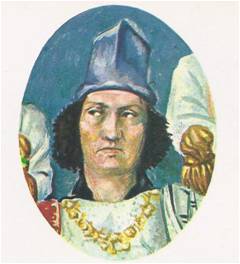WHEN MORE than a century of war between England and France ended in 1453, it was the French king, Charles VII, who was victorious. Although he had driven the English out of France, Charles found himself the king of a sad land. During the wars the great French nobles had fought among themselves as bitterly as they had fought the English and they had become so powerful that they no longer respected their king. France itself was devastated, the people poor and hungry. Paris had been half ruined. Wolves prowled the city by night and twenty-four thousand houses stood empty. Charles worked hard to restore order, setting aside special hours each day for special problems. He organized a permanent army to make himself independent of the nobles, but he found the nobles had no intention of letting him be independent. Many of them rebelled and his own son Louis joined them. Charles died in 1461 and Louis became king — and before long Louis, too, had trouble with the nobles. One great duke, Charles the Bold of Burgundy, even imprisoned Louis in a castle until the king promised to satisfy all the nobles’ demands. After he was freed, however, Louis broke all his promises. He was astoundingly lucky; one by one his greatest rivals died and he inherited their lands. As he gathered in more lands and more power, Frenchmen grew to fear him. They called him the Spider King. Louis’ successors turned to fighting wars in Europe to win new glory for France. Francis I was so successful that he even hoped to be elected the next ruler of the great Holy Roman Empire. He did his best to buy up the votes of the princely electors, but all his gold could not match the riches of the powerful …
Read More »The Hundred Years War 1326-1477
THE LONG STRUGGLE between France and England, known to history as the Hundred Years’ War, was not really a war — and it lasted more than a hundred years. Rather than a war, it was a series of separate battles, with periods of uneasy peace between and it lasted from 1338 to 1453. It was time of misery for both sides, but the French lost more men and saw much of their land devastated. By the end of the Hundred Years’ War, important changes had taken place in both countries. In France, the years of conflict weakened the power of the nobility and led to the rise of a strong middle class. Warfare would never be the same; the English victories showed that mounted knights, weighed down by heavy armour‚ were no match for archers with longbows and the final battles were decided by artillery. The cause of the war was that the English still held the Duchy of Aquitaine, a rich land in southwestern France and were determined not to lose it. The French were equally determined to drive them out. A further complication was the situation in Flanders. The English sold raw wool to Flemish manufacturers, who wove it into cloth and sold a good part of it back to the English. This trade was important to England and even more so to Flanders and both countries were anxious that nothing should happen to disturb it. The English also kept a watchful eye on the Flemish ports, which could serve as a base for a French attack on England or an English attack on the continent. Flanders was not a completely independent state; its ruler, the Count of Flanders, owed allegiance to the king of France. England tried to destroy the count’s authority by stirring up the Flemish …
Read More »

